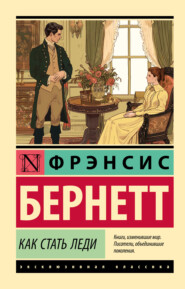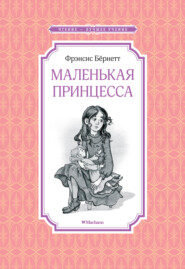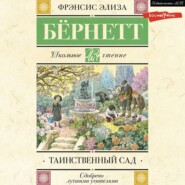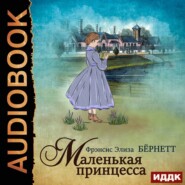По всем вопросам обращайтесь на: info@litportal.ru
(©) 2003-2024.
✖
A Little Princess / Маленькая принцесса. А1
Настройки чтения
Размер шрифта
Высота строк
Поля
lonɡ [lɒŋ] – adj длинный; долгий
odd [ɒd] – adj странный
parent ['peǝr(ǝ)nt] – n родитель
place [pleɪs] – n место; v помещать
remember [rɪ'membǝ] – v вспоминать, запоминать, помнить
rich [rɪʧ] – adj богатый
ride (rode, ridden) [raɪd] – v ездить (верхом); кататься; скользить; мчаться
school [sku:l] – n школа
seem [si:m] – v казаться
send (sent, sent) [send] – v посылать; отправлять
sit (sat, sat) [sɪt] – v садиться, сесть
slowly ['slǝuli] – adv медленно
sure ['ʃuǝ] – adj уверенный, убеждённый
thick [θɪk] – adj толстый; густой; тяжёлый
thouɡhtfulness ['θɔ:tfulnɪs] – n задумчивость; внимательность
uɡly ['ʌɡli] – adj некрасивый, уродливый, безобразный
whisper ['wɪspǝ] – n шёпот; v шептать
write (wrote, written) [raɪt] – v писать
Chapter 2
A French Lesson
When Sara entered the schoolroom the next morning, everybody looked at her with wide, interested eyes. Everyone in the school knew she was the new show pupil of Miss Minchin. One or two of the pupils also saw her French maid, Mariette. Mariette arrived the evening before Sara.
“I saw her maid,” said Lavinia, the thirteen years old girl, to her friend Jessie. “She was opening a box full of rich clothes. She has silk stockings on!”
“And what little feet! I never saw such little feet,” answered Jessie. “Her eyes are such an unusual green color. She's not prettylike other girls. But she makes you want to look at her.”
Sara was sitting quietly in her seat near Miss Minchin's desk. She looked back quietly at the children who looked at her. She wondered what they were thinking of.
“Young ladies,” she said, “I wish to introduce you to your new companion.” All the little girls stood up, and Sara rose also. “She just came to us from far away-in fact, from India. As soon as lessons are over you must make each other's acquaintance.”
The pupils bowed ceremoniously and then they sat down.
“Sara,” said Miss Minchin in her teacher manner, “come here to me.”
Sara went to her politely.
“As your papa hired a French maid for you,” she began, “I believe that he wants you to learn French.”
“I think he hired her,” Sara said awkwardly, “because he-he thought I would like her, Miss Minchin.”
“I believe you always think that things are done because you like them,” said Miss Minchin, with a slightly sour smile. “My impression is that your papa wished you to learn French.”
If Sara wasn't so shy she would explain everything immediately. The fact was that her mother was French, and Captain Crewe loved her language. So it happened that Sara always heard it and was familiar with it.
“The French master, Monsieur Dufarge, will be here in a few minutes,” said Miss Minchin with polite tartness. “Take this book and look at it until he arrives.”
Sara's cheeks felt warm. She went back to her seat and opened the book.
Monsieur Dufarge arrived very shortly afterward. He was a very nice, intelligent, middle-aged Frenchman.
“Is this a new pupil for me, madame?” he said to Miss Minchin. “I hope that is my good fortune.”
“Her papa-Captain Crewe-believes very strongly that she should learn the language. But I am afraid she does not want to learn,” said Miss Minchin.
Little Sara stood up. She felt rather unhappy, as if she were almost in disgrace. She looked up into Monsieur Dufarge's face with her big, green-gray eyes. She began to explain herself quite simply in pretty and fluent French. She explained she did not learn French exactly-not out of books-but her papa and other people always spoke it to her. Monsieur Dufarge began to smile.
“Ah, madame,” he said, “there is not much I can teach her. She did not learn French; she is French. Her accent is perfect.”
Miss Minchin felt mortified.
“Why didn't you tell me?” exclaimed Miss Minchin and turned to Sara.
“I–I tried,” said Sara.
Miss Minchin knew she tried, and that it was not her fault that she was not allowed to explain. She heard Lavinia and Jessie giggling.
“Silence, young ladies!” she said severely.
And she began from that minute to feel rather a grudge against her show pupil.
Glossary
awkwardly ['ɔ:kwǝdli] – adv неуклюже, неловко
beɡin (beɡan, beɡun) [bɪ'ɡɪn] – v начинать
believe [bɪ'li:v] – v верить; думать, полагать
box [bɒks] – n коробка, ящик
odd [ɒd] – adj странный
parent ['peǝr(ǝ)nt] – n родитель
place [pleɪs] – n место; v помещать
remember [rɪ'membǝ] – v вспоминать, запоминать, помнить
rich [rɪʧ] – adj богатый
ride (rode, ridden) [raɪd] – v ездить (верхом); кататься; скользить; мчаться
school [sku:l] – n школа
seem [si:m] – v казаться
send (sent, sent) [send] – v посылать; отправлять
sit (sat, sat) [sɪt] – v садиться, сесть
slowly ['slǝuli] – adv медленно
sure ['ʃuǝ] – adj уверенный, убеждённый
thick [θɪk] – adj толстый; густой; тяжёлый
thouɡhtfulness ['θɔ:tfulnɪs] – n задумчивость; внимательность
uɡly ['ʌɡli] – adj некрасивый, уродливый, безобразный
whisper ['wɪspǝ] – n шёпот; v шептать
write (wrote, written) [raɪt] – v писать
Chapter 2
A French Lesson
When Sara entered the schoolroom the next morning, everybody looked at her with wide, interested eyes. Everyone in the school knew she was the new show pupil of Miss Minchin. One or two of the pupils also saw her French maid, Mariette. Mariette arrived the evening before Sara.
“I saw her maid,” said Lavinia, the thirteen years old girl, to her friend Jessie. “She was opening a box full of rich clothes. She has silk stockings on!”
“And what little feet! I never saw such little feet,” answered Jessie. “Her eyes are such an unusual green color. She's not prettylike other girls. But she makes you want to look at her.”
Sara was sitting quietly in her seat near Miss Minchin's desk. She looked back quietly at the children who looked at her. She wondered what they were thinking of.
“Young ladies,” she said, “I wish to introduce you to your new companion.” All the little girls stood up, and Sara rose also. “She just came to us from far away-in fact, from India. As soon as lessons are over you must make each other's acquaintance.”
The pupils bowed ceremoniously and then they sat down.
“Sara,” said Miss Minchin in her teacher manner, “come here to me.”
Sara went to her politely.
“As your papa hired a French maid for you,” she began, “I believe that he wants you to learn French.”
“I think he hired her,” Sara said awkwardly, “because he-he thought I would like her, Miss Minchin.”
“I believe you always think that things are done because you like them,” said Miss Minchin, with a slightly sour smile. “My impression is that your papa wished you to learn French.”
If Sara wasn't so shy she would explain everything immediately. The fact was that her mother was French, and Captain Crewe loved her language. So it happened that Sara always heard it and was familiar with it.
“The French master, Monsieur Dufarge, will be here in a few minutes,” said Miss Minchin with polite tartness. “Take this book and look at it until he arrives.”
Sara's cheeks felt warm. She went back to her seat and opened the book.
Monsieur Dufarge arrived very shortly afterward. He was a very nice, intelligent, middle-aged Frenchman.
“Is this a new pupil for me, madame?” he said to Miss Minchin. “I hope that is my good fortune.”
“Her papa-Captain Crewe-believes very strongly that she should learn the language. But I am afraid she does not want to learn,” said Miss Minchin.
Little Sara stood up. She felt rather unhappy, as if she were almost in disgrace. She looked up into Monsieur Dufarge's face with her big, green-gray eyes. She began to explain herself quite simply in pretty and fluent French. She explained she did not learn French exactly-not out of books-but her papa and other people always spoke it to her. Monsieur Dufarge began to smile.
“Ah, madame,” he said, “there is not much I can teach her. She did not learn French; she is French. Her accent is perfect.”
Miss Minchin felt mortified.
“Why didn't you tell me?” exclaimed Miss Minchin and turned to Sara.
“I–I tried,” said Sara.
Miss Minchin knew she tried, and that it was not her fault that she was not allowed to explain. She heard Lavinia and Jessie giggling.
“Silence, young ladies!” she said severely.
And she began from that minute to feel rather a grudge against her show pupil.
Glossary
awkwardly ['ɔ:kwǝdli] – adv неуклюже, неловко
beɡin (beɡan, beɡun) [bɪ'ɡɪn] – v начинать
believe [bɪ'li:v] – v верить; думать, полагать
box [bɒks] – n коробка, ящик

















